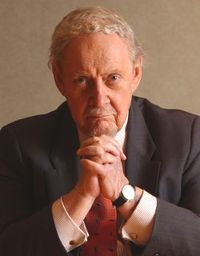Robert Bork
| Robert H. Bork | |||
|---|---|---|---|
| |||
| Born | March 1, 1927 Pittsburgh, Pennsylvania | ||
| Died | December 19, 2012 Arlington, Virginia | ||
| Spouse | Claire Davidson (1952-1980), Mary Ellen Pohl (m. 1982-2012) | ||
Robert Heron Bork (March 1, 1927 – December 19, 2012) served as Solicitor General, acting Attorney General, and circuit judge for the United States Court of Appeals. In 1987, he was nominated to the U.S. Supreme Court by President Ronald Reagan, but was "borked" (defeated by the Democrat-controlled U.S. Senate) because he was not liberal enough for them.[1] Bork went on to become a leading conservative commentator against judicial activism, and was renowned as an expert in antitrust law.
Contents
Early life
Robert was born in Pittsburgh, his father was Harry Philip Bork Jr. and his mother was Elisabeth.
Cox firing
On Saturday October 20, 1973, independent special Watergate prosecutor Archibald Cox issued a subpoena asking for tapes of the Oval Office conversations secretly recorded by President Richard Nixon, and the President ordered Attorney General Elliot Richardson to fire Cox. Richardson resigned instead, and the President ordered Deputy Attorney General William Ruckelshaus to fire Cox, but Ruckelshaus also resigned. Finally Nixon convinced Solicitor General Robert Bork, as acting head of the Justice Department, to fire Cox, and Bork complied. This had an impact upon the Congress's bills of impeachment against Nixon.
In order to poison public opinion about what had taken place, the media took a negative tone and termed the event as the "Saturday Night Massacre".
Supreme Court Nomination
In 1987, President Ronald Reagan nominated Robert Bork to the Supreme Court, but his confirmation did not pass Senate vote when a coalition led by Ted Kennedy led a misinformation campaign against him. 52 out of 54 Democrats voted against him[2] after a highly partisan confirmation hearing that was such a farce that it inspired a new verb, "borked", to mean an orchestrated campaign of distortions and vilification to defeat someone for political motivation.
Bork was best known as a legal expert who has advocated a judicial philosophy called originalism. With originalism in mind, after being voted down for confirmation he authored his best selling book[3] The Tempting of America, in which he argues that the Incorporation doctrine is a large part of modern judicial activism.
Bork has authored many best-selling books, and served on the advisory board of the American Civil Rights Union.
Legacy
Robert Bork died on December 19, 2012, from heart complications.[4] He was hailed for his strong constitutional beliefs and unwavering support of conservative causes. Ed Meese said that he was "one of the great defenders of the Constitution and constitutional fidelity", and Antonin Scalia said that he will be remembered as "one of the most influential legal scholars of the last 50 years".[5] The Federalist Society noted its close working relationship with Bork, citing his understanding of the Founding Fathers and sound constitutional jurisprudence. The Society said of Bork: (he was) "a legal giant, and a man of unsurpassed integrity, intellect, courage, and kindness."[6]
Works
- Bork, Robert H. The Tempting of America: The Political Seduction of the Law (1990) excerpt and text search
- Bork, Robert H. Slouching Towards Gomorrah: Modern Liberalism and American Decline (2003) excerpt and text search
- Bork, Robert H. A Time to Speak: Selected Writings and Arguments (2008)
See also
References
- ↑ See Essay:Best New Conservative Words.
- ↑ https://www.nytimes.com/1987/10/24/us/senate-s-roll-call-on-the-bork-vote.html
- ↑ A Conservative Whose Supreme Court Bid Set the Senate Afire, New York Times
- ↑ Bork, whose failed nomination made history, dies
- ↑ Former Supreme Court nominee Robert Bork dies
- ↑ Scalia, legal community remember Bork
